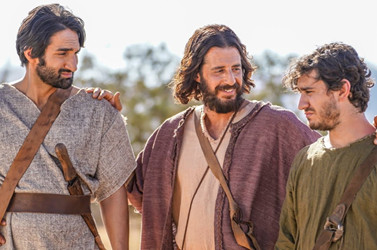Whenever we are faced with having to make adult choices, it is very difficult for us to be totally selfless. We are innately self centered. Subconsciously, at least, we are always asking: "What's in it for us?" Religious decisions are no exception. If we deliberately choose to become disciples of Jesus we too like James and John, might ask: "What reward do you promise us? Will we become powerful and famous?"
 Jesus doesn't play those kinds of games. He makes it very clear that if we choose to follow Him we are asking to become suffering servants like Him. We will be expected to make ourselves vulnerable and expendable. The only greatness we can expect is to be asked to make great sacrifices and to become heroes through suffering and humiliation.
Jesus doesn't play those kinds of games. He makes it very clear that if we choose to follow Him we are asking to become suffering servants like Him. We will be expected to make ourselves vulnerable and expendable. The only greatness we can expect is to be asked to make great sacrifices and to become heroes through suffering and humiliation.
What disappointment Jesus must have felt when James and John put their questions to him. These two were called at the beginning of Jesus’ ministry. They were in the inner circle of the disciples and it’s clear from today’s gospel, they presumed they would have certain privileges and share in power when Jesus triumphed and established his worldly kingdom.
It’s a wonder Jesus has any followers at all at this stage of Mark’s gospel. For these past few Sundays, in the sequence of passages chosen from Mark, we see Jesus teaching his disciples. How hard it will be for the rich to enter the kingdom of heaven. A man may not divorce his wife. We must become childlike to accept the kingdom of God. The Son of Man will suffer and die. Then, Jesus adds, those who follow him must be willing to do the same.
Despite all of this, James and John still ask "What's in it for us? Can we sit at your right hand?"
Discipleship does not simply come from belonging to an elaborate, hierarchical model of "church." Being a disciple is not the same as just being part of the group. Discipleship has its own rewards - not in terms of power and possessions, but in terms of great inner peace, of fulfillment, and of the great satisfaction that comes from loving and serving unselfishly.
Why then do millions of people continue to choose deliberately to become disciples of Jesus? Those who are willing to die to self for the love of God and neighbor are rewarded with an incomparable sense of joy and well being. They are freed up from grasping, greed, insecurity, disappointment and despair. They truly find fulfillment in serving others rather than in being served. They are content to be considered the least. They measure their importance in terms of their compassion and sensitivity.
All of this may seem very theoretical and just a lot of words. But we are all challenged by the demands of the Gospel in the real world of our daily lives. We are expected to be just, to be forgiving, to be servants, to be poor in spirit, to be merciful. Still with each decision we might well ask: "What's in it for us?"
Obviously the answer can only come from the depths of our love for Jesus, and from the example of His own life, death and resurrection. It is coming around full-circle in our understanding of His words: "whoever wishes to be great among you will be your servant; whoever wishes to be first among you will be the slave of all."
The Lord is calling us to get our priorities straight. He is asking us to speak out and to do something real and concrete about injustice and human dignity. And He is challenging us to sacrifice our complacency and comfortable-ness for the sake of our fellow pilgrims at home as well as abroad.
If we can do just this, then we will find that the answer to "What's in it for us?" is far beyond what we could have ever hoped for.
And we can leave the seating arrangements at the table in the reign of God to God.





